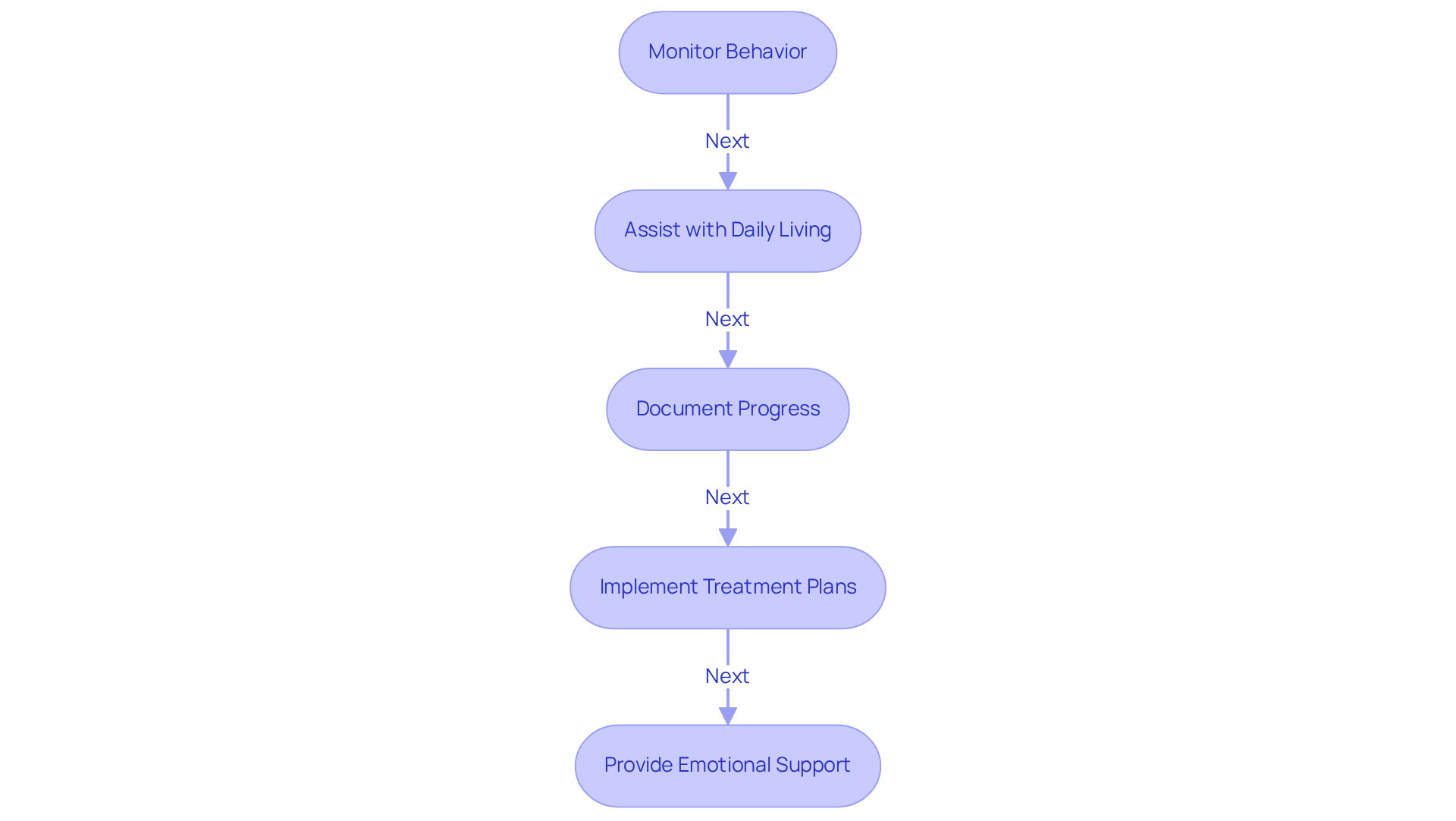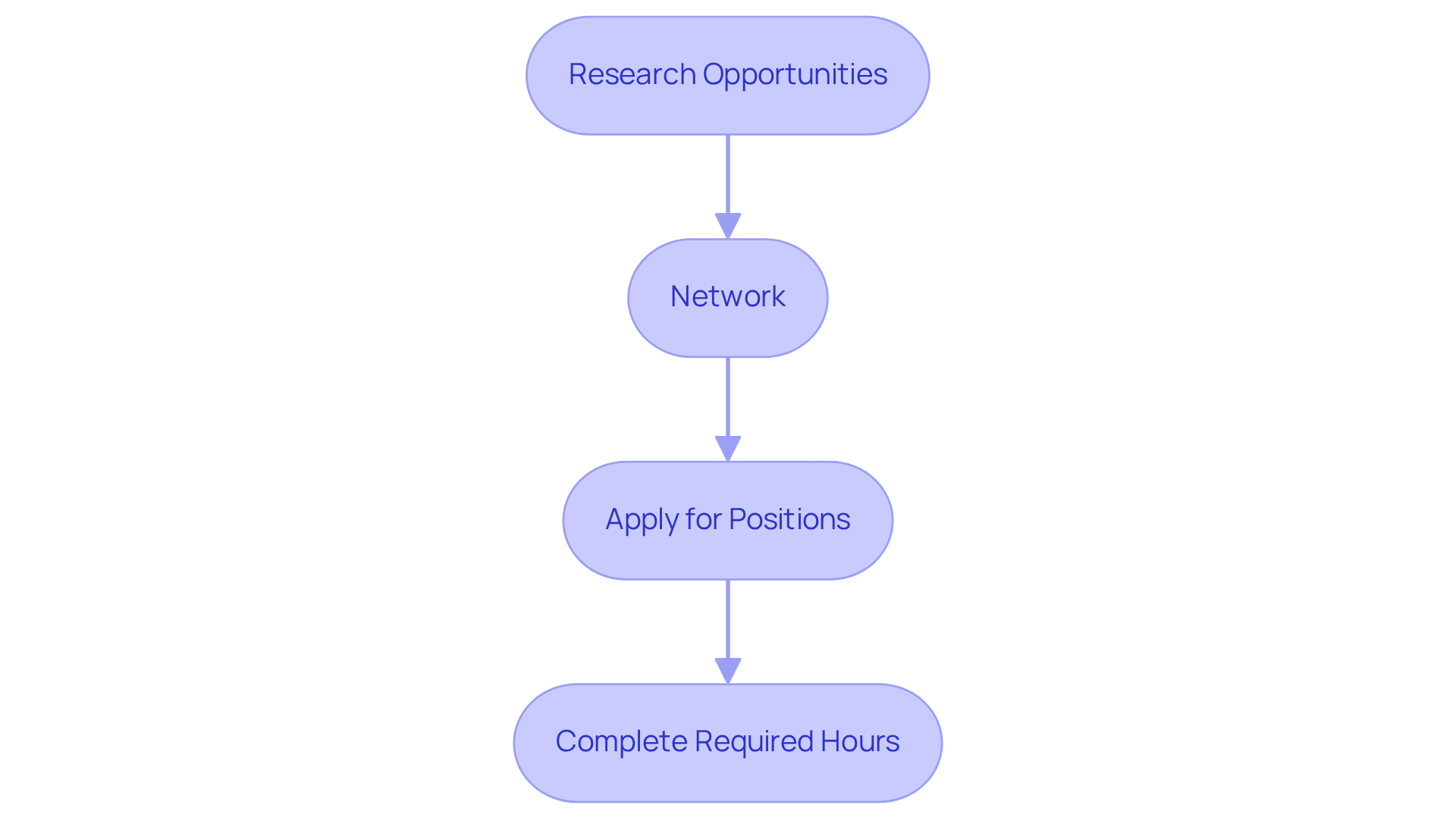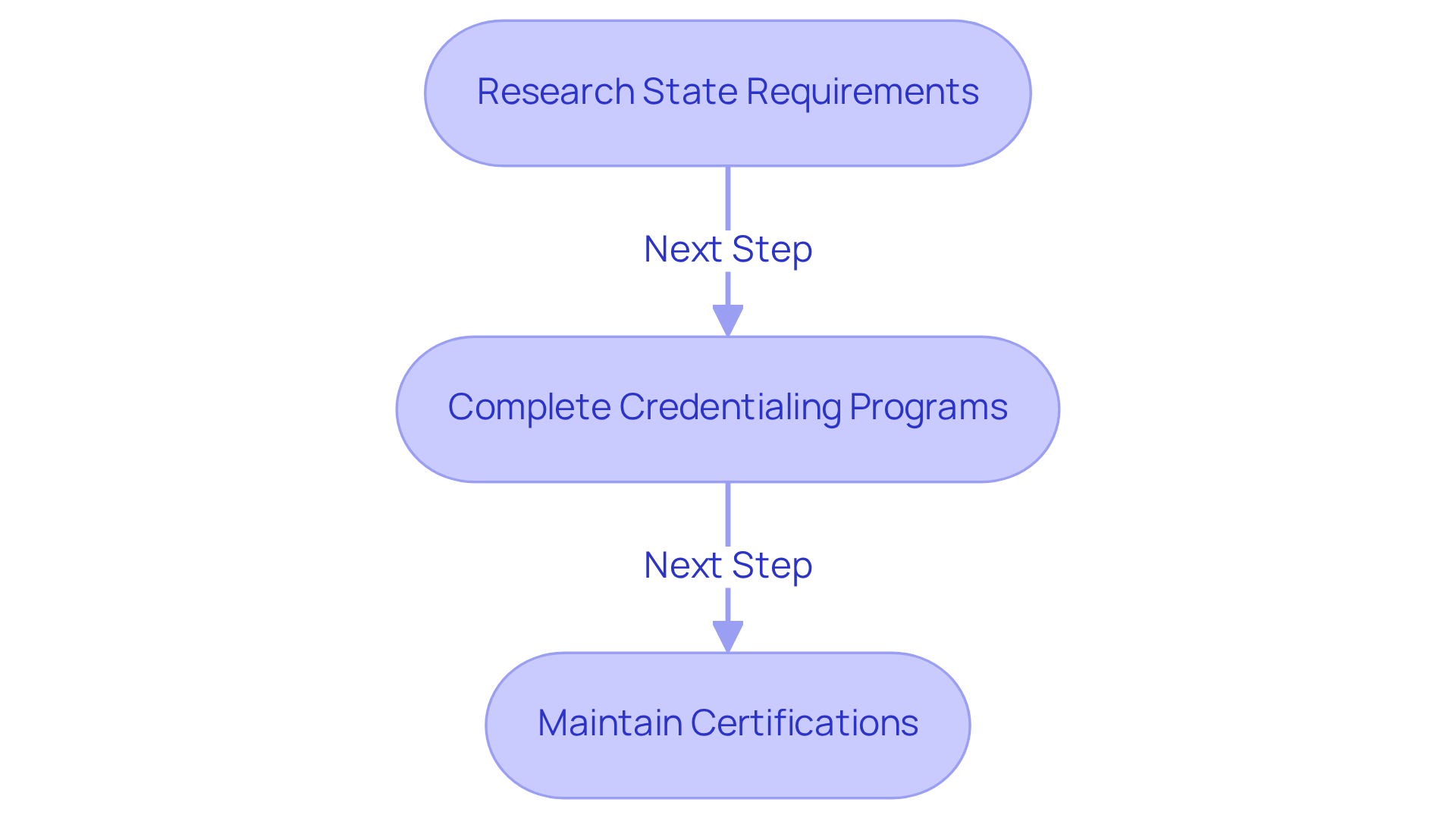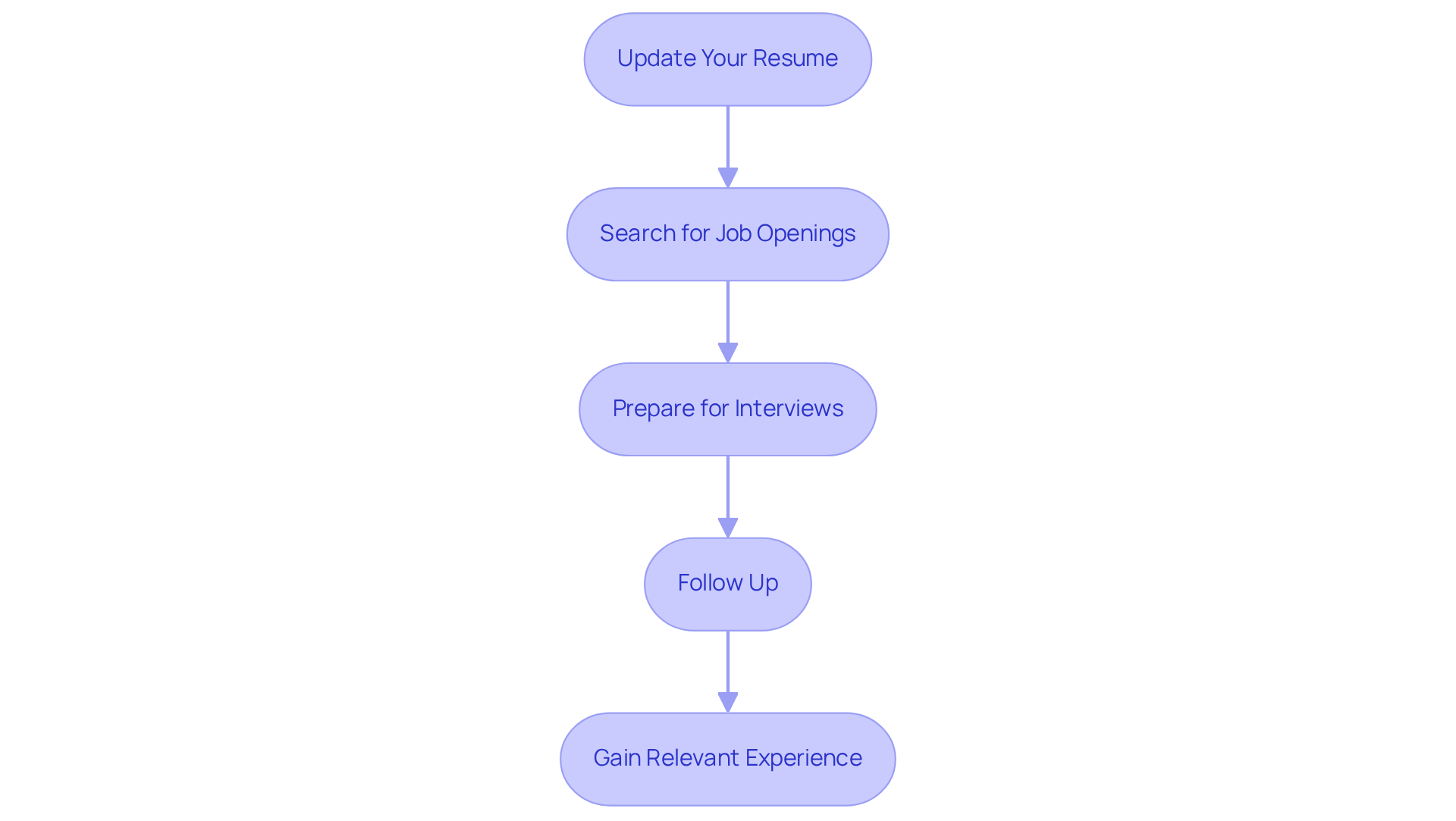September 3, 2025

To become a Behavioral Health Technician (BHT), individuals must complete essential education and training, gain clinical experience, and obtain relevant licenses and certifications. The steps outlined for this career path underscore the critical importance of:
These elements not only enhance employability but also address the growing demand for mental health professionals. Are you prepared to meet this demand? By following these steps, you can position yourself as a qualified candidate in a vital field.
The demand for Behavioral Health Technicians (BHTs) is surging, driven by a growing recognition of the importance of mental health care. This role not only provides critical support to individuals facing mental health challenges but also offers a fulfilling career path for those passionate about making a difference.
However, aspiring BHTs may wonder: what steps are necessary to enter this rewarding field, and how can they stand out in a competitive job market?
This guide outlines the essential steps to become a BHT, from understanding the role and completing educational requirements to gaining practical experience and securing the necessary certifications, ultimately paving the way for a successful career in behavioral health.
A Behavioral Health Technician (BHT) is essential in supporting individuals facing mental health challenges or developmental disabilities. With a rising demand for these professionals, is crucial. BHTs:
Aspiring BHTs must understand how to become a behavioral health technician by grasping these responsibilities to navigate the challenges and rewards of the role. Typically, candidates are required to possess a high school diploma or GED, with many employers favoring post-secondary education. The job outlook for BHTs is promising, with the Bureau of Labor Statistics projecting a 9% increase in BHT positions by 2031, underscoring the growing need for these professionals.
First Aid and CPR training is often a prerequisite, and familiarity with electronic health records (EHR) systems is advantageous for documentation and communication tasks. BHTs must demonstrate strong problem-solving abilities and be ready to work flexible schedules, including nights and weekends. Mental health professionals stress that BHTs significantly enhance patient care outcomes by nurturing a supportive environment and facilitating therapeutic activities. Successful BHT training programs provide candidates with the necessary skills and knowledge on how to become a behavioral health technician, ultimately leading to improved patient recovery and well-being.
How prepared are you to meet the demands of this evolving field?

To learn how to become a behavioral health technician (BHT), candidates must fulfill specific that enhance their employability and effectiveness in the role. The demand for certified Mental Health Technicians is growing, with many employers progressively necessitating postsecondary education as a criterion for hiring.
According to the U.S. Bureau of Labor Statistics, there is projected to be a 6% increase in Mental Health Technician positions between 2016 and 2026. Learning how to become a behavioral health technician not only improves job opportunities but also increases earning potential, with hourly wages for technicians ranging from $14.75 to $31.92. This makes certification a vital step for those aspiring to advance their careers in behavioral health. Are you ready to take the next step in your career? Consider the importance of these educational requirements and how they can set you apart in a competitive job market.

To effectively prepare for a career and learn how to become a behavioral health technician (BHT), acquiring clinical skills is essential. Consider this: nearly 20% of American adults face some form of mental illness in their lifetime, underscoring the growing demand for BHTs in the healthcare system. Here are key steps to secure internships or practicums:
Gaining this knowledge not only enhances your resume but also offers essential insights into the daily duties of a BHT. As noted by industry experts, internships are vital for bridging the gap between academic knowledge and practical application, which is crucial for understanding how to become a behavioral health technician and enhancing your readiness for a successful career in the field.

After completing your education and gaining clinical experience, the next step is to understand how to become a behavioral health technician by securing the essential licenses and certifications vital for your career.
Acquiring the appropriate qualifications significantly boosts your employability and showcases your dedication to excellence in how to become a behavioral health technician. Industry experts assert that these credentials not only elevate your professional standing but also enhance your capacity to contribute effectively within various healthcare settings.

Once you have the necessary education, experience, and certifications, it’s time to apply for jobs. Did you know that in 2025, the job market is projected to have approximately 21,200 openings annually for psychiatric technicians and aides? This statistic highlights the .
By following these steps, you can effectively navigate the job application process and significantly enhance your chances of learning how to become a behavioral health technician. Are you ready to take the next step in your career?

Becoming a Behavioral Health Technician (BHT) is a rewarding journey that demands dedication, education, and practical experience. This guide outlines the essential steps to navigate this career path, emphasizing the importance of:
Each stage is crucial in equipping aspiring BHTs with the skills and knowledge needed to support individuals facing mental health challenges effectively.
Key insights shared underscore the significance of hands-on experience through internships, the value of obtaining certifications like the Certified Behavioral Health Technician (CBHT), and the necessity of staying informed about state-specific licensing requirements. The article also highlights the promising job outlook for BHTs, driven by an increasing demand for mental health services. This creates an opportune moment to enter the field.
Ultimately, pursuing a career as a Behavioral Health Technician not only opens doors to professional growth but also allows individuals to make a meaningful impact in the lives of those they serve. For anyone considering this path, the time to act is now—embrace the educational opportunities, seek out practical experiences, and prepare for a fulfilling role that contributes significantly to the well-being of others.
What is the role of a Behavioral Health Technician (BHT)?
A BHT supports individuals facing mental health challenges or developmental disabilities by monitoring behavior, assisting with daily living activities, maintaining documentation, implementing treatment plans, and providing emotional support.
What are the key responsibilities of a BHT?
Key responsibilities include monitoring patients' behavior, assisting with personal hygiene and meal preparation, documenting patient progress, implementing treatment plans under supervision, and providing emotional support and crisis intervention.
What educational requirements are necessary to become a BHT?
Candidates typically need a high school diploma or GED, with many employers preferring postsecondary education such as a certificate or associate degree in behavioral health or a related field.
Is certification important for BHTs?
Yes, enrolling in a certification program is highly recommended as it includes specialized training in crisis intervention, patient care, and ethical practices, which are crucial for success in the field.
What is the job outlook for Behavioral Health Technicians?
The job outlook is promising, with a projected 9% increase in BHT positions by 2031, indicating a growing need for these professionals.
What skills are important for a BHT?
Important skills include strong problem-solving abilities, the capacity to work flexible schedules, and familiarity with electronic health records (EHR) systems for documentation and communication.
What are the typical hourly wages for BHTs?
Hourly wages for technicians range from $14.75 to $31.92, depending on experience and qualifications.
What training is often required before becoming a BHT?
First Aid and CPR training is often a prerequisite for BHT positions, along with specialized training in behavioral health practices.
Our expert recruitment strategies and AI-driven sourcing ensure that you receive top-notch candidates quickly, without compromising on quality. Whether you’re looking for BCBAs, Clinical Directors, or RBTs, we’ve got you covered.